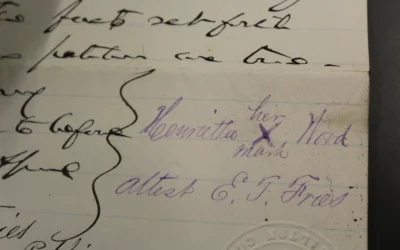Discover the rich history of early Kentucky through the lens of genealogy with Littell’s Law Books, an invaluable resource for family history research. As a less-known yet equally insightful counterpart to the renowned Virginia Hening’s Statute at Large. These historical records offer a unique window into the lives of those who laid the groundwork for the state we know today. Littell’s collection of legal documents provides detailed records that can help trace your Kentucky ancestry back to the pioneer days.
This guide walks you through the wealth of information that lies within these early 19th-century volumes and show you how to use them for your Kentucky genealogical research.
What Are These Books?
In the early 19th century, Kentucky lawyer William Littell (1768-1824) with the help of Jacob Swigert (1793-1869) compiled a comprehensive record of the state’s laws in a five-volume work known as Littell’s Statute Law of Kentucky.
Covering the years from 1792 to 1816, the books document the Kentucky General Assembly’s early proceedings in a five volume set. These volumes serve as the first meticulously edited compilation of Kentucky statutes and hold immense significance for historians studying the state’s early years. They provide a comprehensive understanding of the formation of cities and towns, the regulation of marriages on the Western frontier, and other aspects of early Kentucky life.
While these volumes primarily focus on important issues like county establishment, road creation, and the appointment of positions, they also contain a wealth of personal information about early Kentucky settlers. This includes details on financial transactions, land sales, and even divorce records. As a result, they are highly regarded as invaluable resources for genealogists and those interested in exploring their family history in Kentucky.
Recognized as foundational documents for state law, these volumes offer a unique perspective on the development of Kentucky as a young frontier state. Historians greatly value them as primary sources, shedding light on the state’s early legislative actions and decisions.
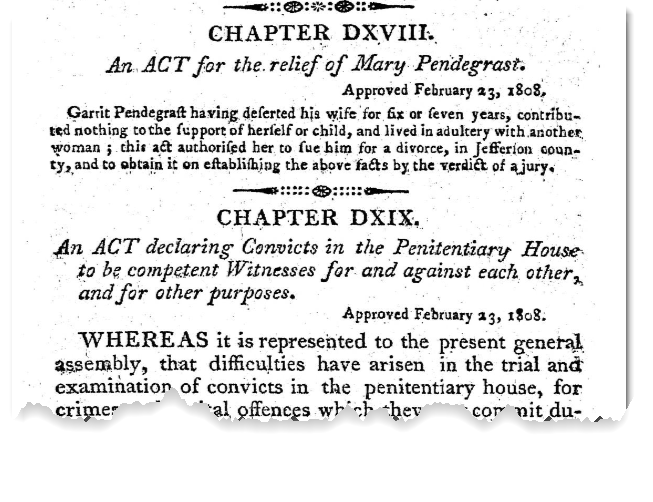
Example of Littell’s Law Book, Vol 3, showing a divorce approval next to who can be a competent witness.
Who Was William Littell?
William Littell was born on October 12, 1768, in Fauquier County, Virginia. He moved to Kentucky in 1792 and settled in Lexington. In his legal career, Littell served as the United States Attorney for Kentucky from 1802 to 1806. He was also appointed as a judge of the Kentucky Court of Appeals, serving from 1806 until his death in 1824.
Littell played a significant role in shaping the early legal system in Kentucky and was known for his legal expertise and contributions to the development of the state’s jurisprudence. Additionally, Littell was involved in public service and held various positions in Kentucky, including serving in the Kentucky House of Representatives from 1798 to 1802. He was also a delegate to the Kentucky Constitutional Convention in 1799 and was instrumental in drafting the state’s first constitution.
Littell was assisted by the younger Jacob Swigert (1793-1869), a lawyer, judge, and native Kentuckian. Swigert’s involvement in politics started in the 1820s when he served as a member of the Kentucky House of Representatives. He went on to represent Franklin County in the Kentucky Senate from 1830 to 1836. During his time in the legislature, Swigert was known for his advocacy of infrastructure improvements, including the construction of railroads and canals.
Finding Your Kentucky Ancestor
Certainly, there is a plethora of information, names, and dates for the early Kentuckians, but how can you find your Kentucky family member?
In 1931, WT Smith published an index to these volumes called A Complete Index to the Names of Persons, Places and Subjects Mentioned in Littell’s Laws of Kentucky. This book contains about 5,000 surnames from early Kentucky settlers. This index, arranged in alphabetical order, features not just individual surnames, but also institutions and county names. Each entry shows of its appearances and specific references to the volume and page number where it can be found in Littell’s books.
Since the legislature in those days passed acts concerning many minor, detailed subjects, Littell’s books contain many early Kentucky settler’s names. You would not find this personal and detailed information in statutes of today. Here are some examples:
- Names and residences of persons selected as trustees of schools in many counties
- Names of persons allowed to have a well dug on the courthouse square in New Castle
- Residents along the boundaries of State precinct in Montgomery County
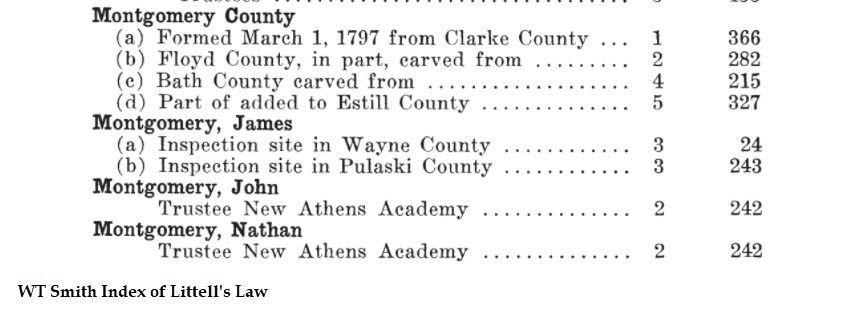
Using these Books to Verify Your Family Tree
If you know the name of any ancestor who might have been in Kentucky in the early years, checking Smith’s index may turn up evidence he was in Kentucky at a specific date. This provides rich details about what your Kentucky ancestor was doing.
Let’s consider the following examples where you are researching if James and Margaret Richeson divorced.
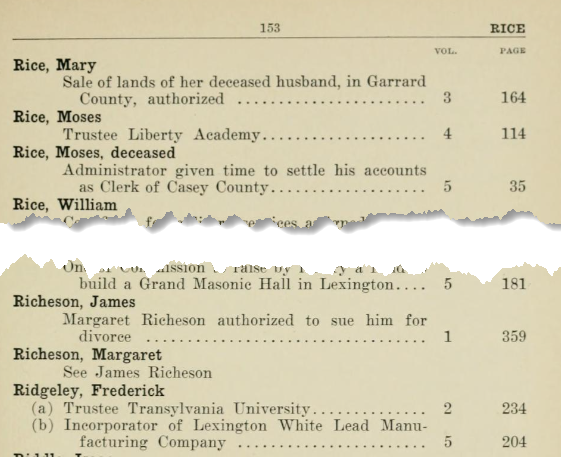
From this index, you can check Volume 1, page 359 for any additional details. Sure enough, you learn the date of the act which was 1795 and the reason. He deserted her by becoming a Spanish subject. At that time Spain controlled a significant portion of what is now Florida and Louisiana. [Now you have a new place to research for him.]
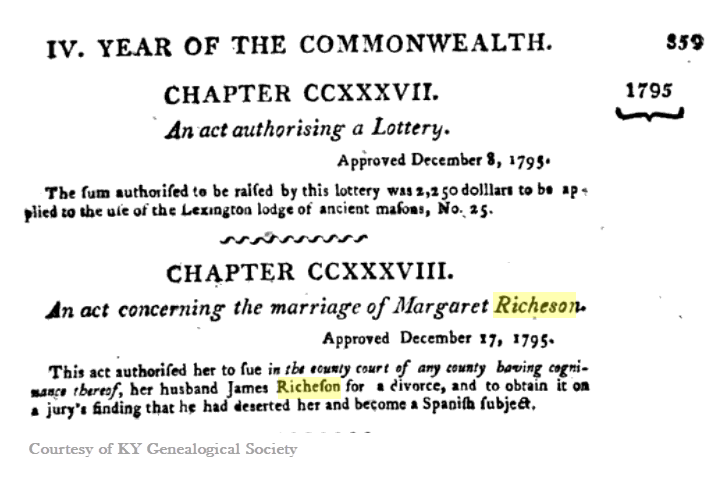
This is how you would cite this item for you research using Chicago Style:
Littell, William. The Statute Law of Kentucky: 1792-1797. Vol. 1, p. 359. United States: William Hunter, 1809.
Notes:
- Always be open to creative name spellings.
- An “f” was used in place of an “s” in these texts.
As you can see, this information can prove invaluable when citing these documents in your genealogical research. You now have a direct references to primary sources that substantiate your family history.
Finding These Resources
Lucky for you, universities have digitized these indispensable volumes and made them freely available to family researchers.
Littell’s Law Books
These books are available from the Internet Archive but likely other digital locations as well.
- Volume One; Published 1809
- Volume Two; Published 1810
- Volume Three: Published 1811
- Volume Four; Published 1814
- Volume Five; Published 1819
Index to Littell’s Law Books
You can find the digitized index in two locations:
- University of Illinois Urbana-Champaign placed the index on the Internet Archive.
- University of Michigan placed the index on the HathiTrust site.
You can access these volumes or the index at many libraries. Use the WorldCat site to find a printed version nearest to you.
Other Resources
Editor’s Note
The original post content was based on an article by Landon Willis.





